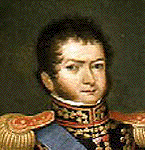August 20: Bernardo O'Higgins
Bernardo O'Higgins (1778)
It was on this date, August 20, 1778, that the Irish-Chilean soldier and statesman Bernardo O'Higgins was born Bernardo O'Higgins Riquelme in Chillán, Chile. His father was an Irish engineer who refused to marry his mother, the daughter of an aristocratic Chilean family. His absent father at least saw that O'Higgins was baptized a Catholic and educated, first in Chile and Peru, and then in England. It was in London that Bernardo met his mentor, Sebastián Francisco de Miranda y Rodríguez, a Venezuelan, and adopted Rationalist and republican views.
Although his father had been Governor of Chile for the Spaniards, Bernardo used his inherited wealth to fund an opposition force demanding complete independence from Spain. He became a general in the army of liberation and joined the anticlerical rebels, achieving victory at last in 1818. He was for a time a benevolent dictator of Chile and instituted reforms in the economic and social order, establishing colleges, libraries and hospitals. But he moved too rapidly, and his political base was small. When he tried to establish democracy and abolish titles of nobility, the church and the oligarchy combined against him. In 1823, he agreed to resign and leave the country.
In 1842, having been rehabilitated in Chile during his exile, the Chilean National Congress voted to allow O'Higgins to return to his native country. But he died en route in Lima on 24 October 1842, age 64, and was buried there with great honor. His remains were repatriated to Chile in 1869.
The Avenida Libertador General Bernardo O'Higgins, the main thoroughfare of Santiago, is named in his honor. Like his friend and mentor, Miranda, Bernardo O'Higgins was an Atheist.
Originally published August 2003 by Ronald Bruce Meyer.


